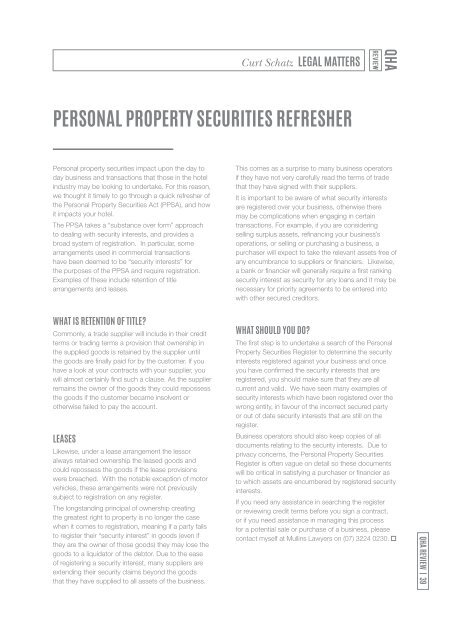QHA_May_sm_for web
Create successful ePaper yourself
Turn your PDF publications into a flip-book with our unique Google optimized e-Paper software.
Curt Schatz<br />
LEGAL MATTERS<br />
PERSONAL PROPERTY SECURITIES REFRESHER<br />
Personal property securities impact upon the day to<br />
day business and transactions that those in the hotel<br />
industry may be looking to undertake. For this reason,<br />
we thought it timely to go through a quick refresher of<br />
the Personal Property Securities Act (PPSA), and how<br />
it impacts your hotel.<br />
The PPSA takes a “substance over <strong>for</strong>m” approach<br />
to dealing with security interests, and provides a<br />
broad system of registration. In particular, some<br />
arrangements used in commercial transactions<br />
have been deemed to be “security interests” <strong>for</strong><br />
the purposes of the PPSA and require registration.<br />
Examples of these include retention of title<br />
arrangements and leases.<br />
This comes as a surprise to many business operators<br />
if they have not very carefully read the terms of trade<br />
that they have signed with their suppliers.<br />
It is important to be aware of what security interests<br />
are registered over your business, otherwise there<br />
may be complications when engaging in certain<br />
transactions. For example, if you are considering<br />
selling surplus assets, refinancing your business’s<br />
operations, or selling or purchasing a business, a<br />
purchaser will expect to take the relevant assets free of<br />
any encumbrance to suppliers or financiers. Likewise,<br />
a bank or financier will generally require a first ranking<br />
security interest as security <strong>for</strong> any loans and it may be<br />
necessary <strong>for</strong> priority agreements to be entered into<br />
with other secured creditors.<br />
WHAT IS RETENTION OF TITLE?<br />
Commonly, a trade supplier will include in their credit<br />
terms or trading terms a provision that ownership in<br />
the supplied goods is retained by the supplier until<br />
the goods are finally paid <strong>for</strong> by the customer. If you<br />
have a look at your contracts with your supplier, you<br />
will almost certainly find such a clause. As the supplier<br />
remains the owner of the goods they could repossess<br />
the goods if the customer became insolvent or<br />
otherwise failed to pay the account.<br />
LEASES<br />
Likewise, under a lease arrangement the lessor<br />
always retained ownership the leased goods and<br />
could repossess the goods if the lease provisions<br />
were breached. With the notable exception of motor<br />
vehicles, these arrangements were not previously<br />
subject to registration on any register.<br />
The longstanding principal of ownership creating<br />
the greatest right to property is no longer the case<br />
when it comes to registration, meaning if a party fails<br />
to register their “security interest” in goods (even if<br />
they are the owner of those goods) they may lose the<br />
goods to a liquidator of the debtor. Due to the ease<br />
of registering a security interest, many suppliers are<br />
extending their security claims beyond the goods<br />
that they have supplied to all assets of the business.<br />
WHAT SHOULD YOU DO?<br />
The first step is to undertake a search of the Personal<br />
Property Securities Register to determine the security<br />
interests registered against your business and once<br />
you have confirmed the security interests that are<br />
registered, you should make sure that they are all<br />
current and valid. We have seen many examples of<br />
security interests which have been registered over the<br />
wrong entity, in favour of the incorrect secured party<br />
or out of date security interests that are still on the<br />
register.<br />
Business operators should also keep copies of all<br />
documents relating to the security interests. Due to<br />
privacy concerns, the Personal Property Securities<br />
Register is often vague on detail so these documents<br />
will be critical in satisfying a purchaser or financier as<br />
to which assets are encumbered by registered security<br />
interests.<br />
If you need any assistance in searching the register<br />
or reviewing credit terms be<strong>for</strong>e you sign a contract,<br />
or if you need assistance in managing this process<br />
<strong>for</strong> a potential sale or purchase of a business, please<br />
contact myself at Mullins Lawyers on (07) 3224 0230.<br />
<strong>QHA</strong> REVIEW | 39

















